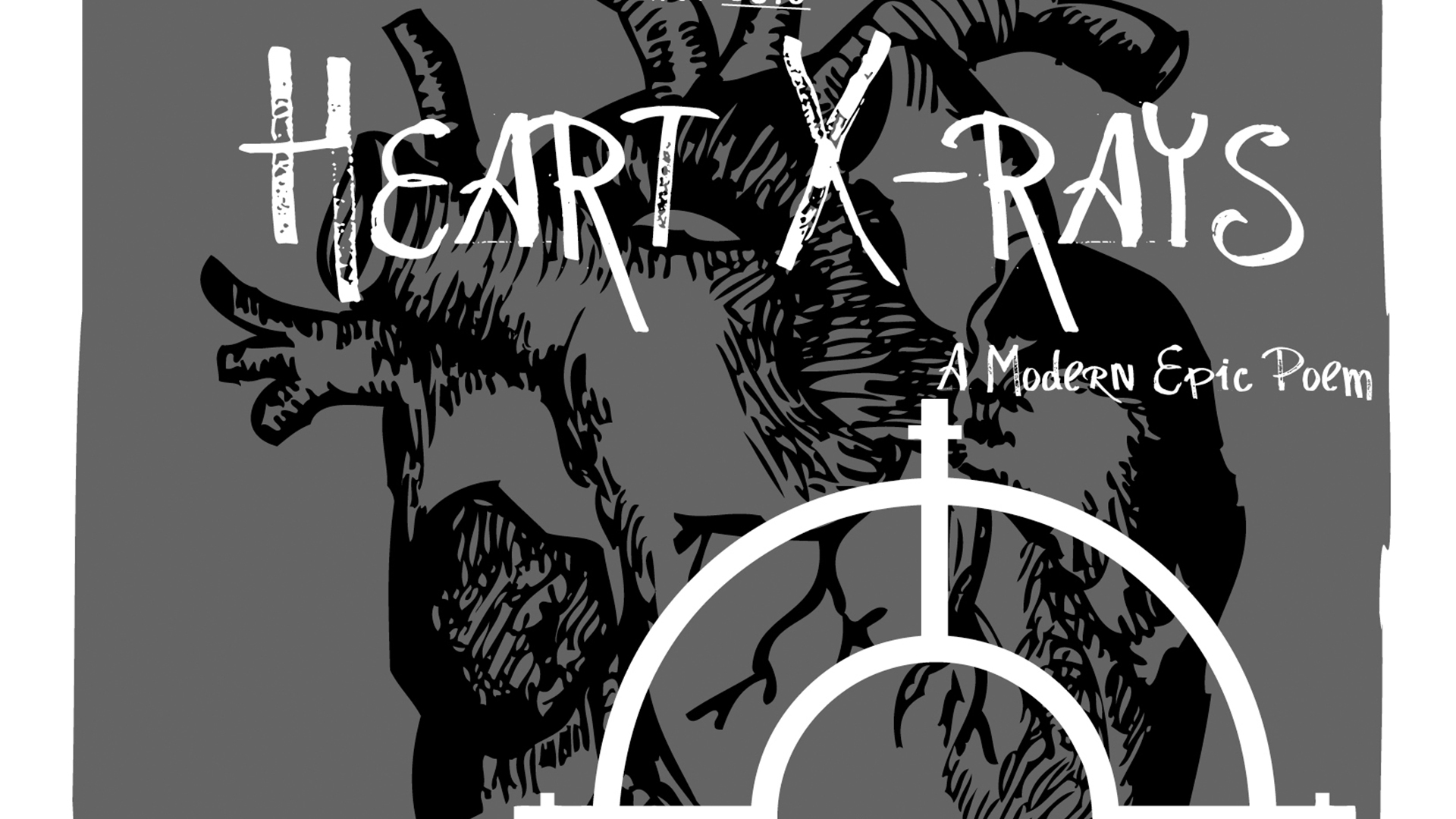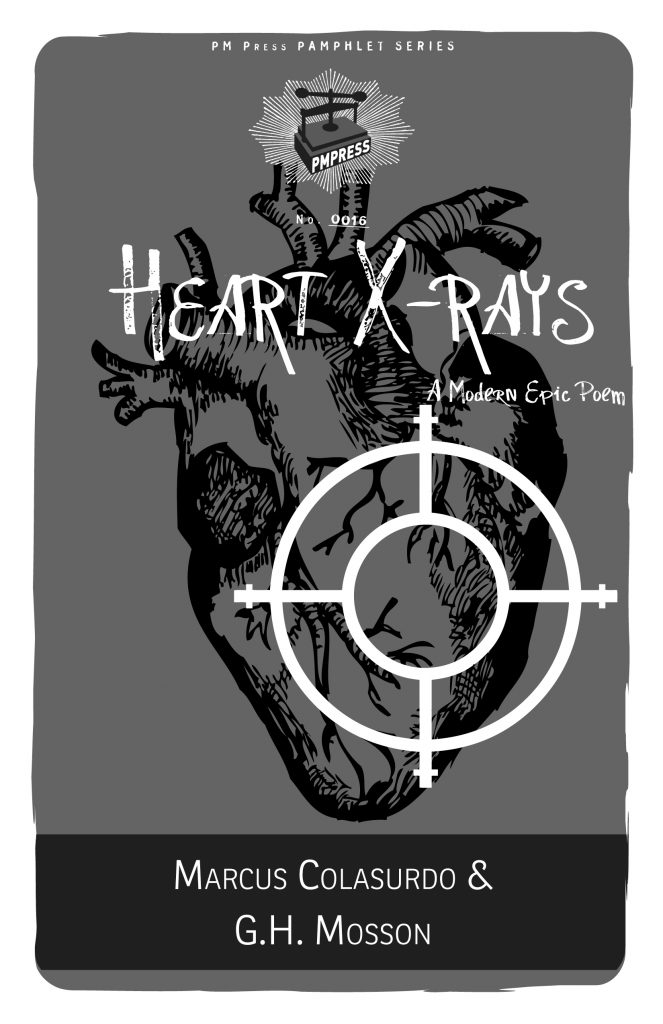By Patric Pepper
Barrelhouse
October 3rd, 2019
The authors of this collaboration, Heart X-rays: A Modern Epic Poem, are not new to the apparent insanity of the early 21st century. They have both endeavored to awaken America’s spirit through creative work. Colasurdo’s varied work life includes a long line of blue collar jobs, and he has worked as a Job Corps counselor, journalist, and teacher, along with publishing 11 other books. Mosson has long been an antiwar protestor; he published the journal and anthology Poems Against War in the early 2000s, and several collections of his own. He currently practices employee rights and disability law.
It is with the lives of these two poets in mind that one should read the rush—sometimes the avalanche—of language found in Heart X-rays. Here is the opening stanza of their book:
Out of the dream machine, far
from my parents’ daytime haul, out
of these mirrory blank smiles, far even from
contraband nights of metamorphosis, unplug my sight;
out of the screaming pass & fail, no longer below salivating
billboards, beyond values bartered and sold, far
from the scramble for value, far away
from the famished addicted wired walkers
of the fattest cities, away from the obesity
of replicated sameness, utopia’s five-dollar whores,
release me toward
an elixir that nourishes
This passage encapsulates one of the themes of the collection: frustration with the social and moral, secular and spiritual, choices America makes. Here’s an example from a rather joyous poem, “Soul Kitchen,” which reveals the influence of hip-hop:
It’s a blue-collar
blue-aproned ballet.…
It’s a two-step peel and prep.
It’s a mighty nice slice and dice.
It’s a shimmy-shake boil and bake.
It’s a three-course tour de force
with a salad to open –
and just exactly like you’re hope’n,
there’s music in this menu:
This hip-hop inspiration invigorates the collection and intensifies the contemporaneous nature of the writing. Additionally, the book features references to pop culture figures like Banksy and Pussy Riot.
It is our lack of insight into America’s human predicament that this collection takes as its subject. Yet transcendence surfaces as the other important theme. The best example of transcending the frustration of America’s failure of insight into its careless and premeditated ways is comparing the images of the two towers in the book. The tower in “Below the Tower” is a modern Tower of Babel, located in a modern Babylon:
What thin tower is this
and where are the magicians
among the lines at the monolith’s foot?
I hear the people grumble, impatient,
sleepwalking through a chant
they barely recall. Whose ziggurat
winds up toward speechless skies?
The shamans have been slaughtered
and the hum of their hints
blows a distant breeze
elsewhere. A nation of talkers
mobs airwaves with gossipy tongues—
remote on—
remote off—
The tower appears to equip and facilitate a nation of talkers to simply babble on. Babylon: the city of the ancient Hebrews’ painful exile.
Another tower appears in “Ringing the Bells,” toward the end of the collection. This poem at first echoes the tawdry aspects of “Below the Tower,” like “utopia’s five dollar whores,” the “salivating billboards” and idle “talk-talk.” Yet it asks the question, “Do you hear some bells, someone ringing them?” The poem goes on to quote Psalm 137:
By the rivers of Babylon, we sat down
and how we wept, when we remembered….
Whose courage of climbing
though lonely silence
brings about such sweet chiming?
Here is insight, weeping and catharsis. The bells bring the promise of new song. In the psalm, the Hebrews had hung their harps on willow trees by the river, unable to sing. In “Ring the Bells” they do hear bells, and they may know that singing will be possible again. Here is the longed-for transcendence for America. All is not lost. If this second tower is a Tower of Babel, it is fundamentally different: its bells ring with hope.
Heart X-rays: A Modern Epic Poem does not rationalize our American predicament. Who can rationalize the human heart? It creates a mix of sensibilities, from beat poetry to hip-hop and everything in between. Epic in scope, if not in length, it’s a work of art to feel in relation to the world we have created. Sometimes our destruction seems assured, but Colasurdo and Mosson—in the end—beg to differ.
Patric Pepper has published two poetry chapbooks, Zoned Industrial, and Everything Pure as Nothing. His full-length book, Temporary Apprehensions, was a winner of the Washington Writers’ Publishing House Poetry Prize. His work has appeared most recently in Beltway Poetry Quarterly, Gargoyle, Okay Donkey Mag, and The Northern Virginia Review. He lives in Washington, D.C. with his wife, poet Mary Ann Larkin.
Back to G.H. Mosson’s Author Page | Back to Marcus Colasurdo’s Author Page







